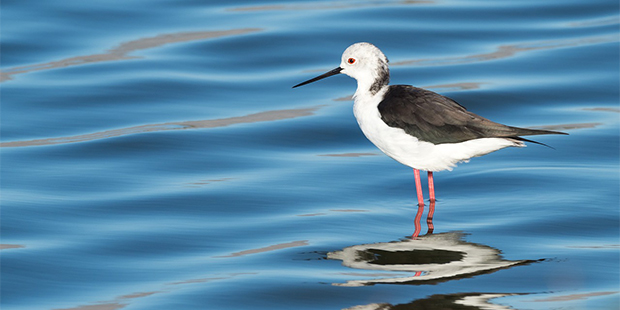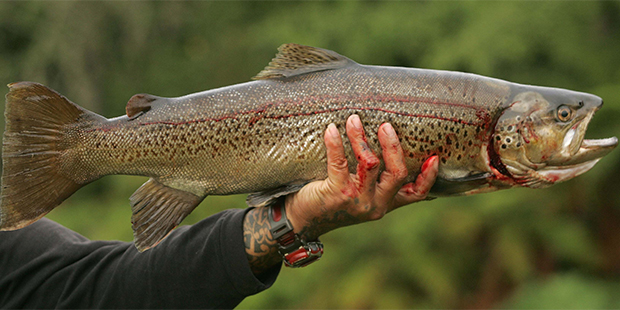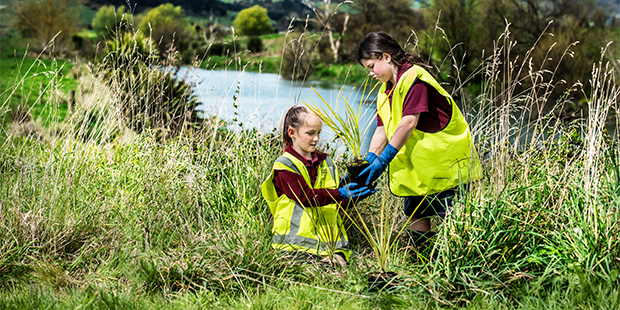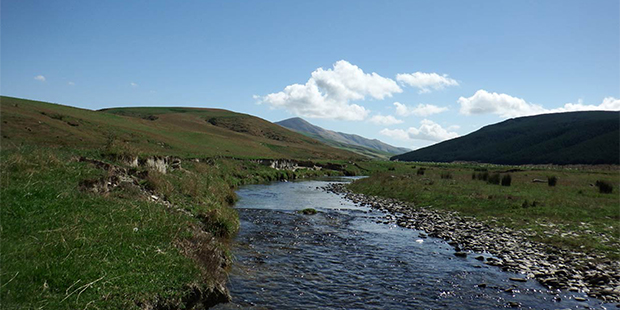Trail blazing wetland clean-up
School students chip in to help get rid of a ‘mess of willow and privet’ choking a local habitat.


Wetlands along one of New Zealand’s most popular bike trails - the Hauraki Rail Trail - have been on the receiving end of a considerable amount of TLC from local schools, farmers and other environmental groups in recent years.
Students from Hikutaia School near Thames and Miller Avenue School near Paeroa are among those working to clear privet from wetland areas the trail passes along and re-planting a mix of native species in its place.
Native plants, which play a vital role around wetlands by providing shade, cooling the water and helping filter out sediment and nutrient before it gets in to the water, are threatened by invasive pest weeds like privet.
The work, along sections of the 200km trail near Waihi, has been undertaken under the guidance of Waihi’s Habitat Enhancement Landcare Programme (HELP), a group which has considerable buy-in from local farmers and was set up originally by Forest and Bird, gold mine operator Newmont Waihi Gold and local schools.
HELP chairman Warwick Buckman says a lot of the work has been involved in clearing privet which has been invading the land for many years, long before the weed was first tackled by the group.
He says planting to increase native biodiversity is an ongoing task and it is here where local schoolchildren have been brought in to help when the work is suitable for them. Students from Hikutaia School have helped with clearing and cutting, while in August those from Miller Avenue School put in more than 1500 plants in the second year of their involvement in the project.
The trail runs from Kaiaua on the Firth of Thames through Karangahake Gorge to Waihi before finishing at Matamata.
Buckman says donations from local groups such as competitors in the annual Nugget Multisport Festival’s 23km trail run allow HELP to complete work they already have underway and to plan for future priorities.
“We feel we’ve made quite a difference in the Waihi area and now we’re looking to work on the Paeroa to Te Aroha stretch of the trail which runs through wetlands and is a mess of privet and willow,” he says. “We’re looking at ways we can tackle that.”
He says as well as the rail trail, HELP has worked on other big projects (with the Ministry for the Environment) along streams in the Waihi area.
HELP was established in 1997 and one of its most important roles is working with local farmers; in recent years it has carried out planting with five local dairy and sheep and beef farmers on six different properties.
“Farmers want to leave something behind,” says Buckman. “In the last two years we’ve had more buy-in from farmers; for example we have one hill country farmer fencing of all his gullies.”
Buckman used to teach at Waihi College where HELP’s nursery was set up on a leased section of what was once the college’s farm.
He retired from full-time teaching in 2006 and took on the job as HELP’s operations manager and today, with support from local and national businesses and organisations, its 25 members and two part-time nursery employees between them collect, propagate and grow up to 25,000 natives each year.
“We go out and gather seedlings and have good and bad years,” he says. “We know the areas in the valleys where we can collect those which are good seeders – some of them are from our own plantings.”
One dairy farmer who turned to HELP when he was carrying out riparian planting after applying for a resource consent at his two farms south of Waihi was Dennis Orchard.
“I was busy upgrading the effluent system on one farm and building a new milking shed on the other,” he says. “I’m not a horticulturalist and I would have been completely in the dark as to what species to plant.”
So he contacted HELP – and today the group is in its third year of planting on Orchard’s 100 and 80 hectare properties (they are 5km apart and combined milk 540 cows).
“I’d done considerable planting of shade trees and shelterbelts before but I hadn’t done any riparian planting.”
Orchard carried out the fencing required while he says the Hauraki District Council met around a third of the cost of the plants and the digger hire.
But he says he could never have provided the labour for the planting: “It would have taken me five or six years to do what HELP have done in three. They had the plants, the know-how and the manpower.”






